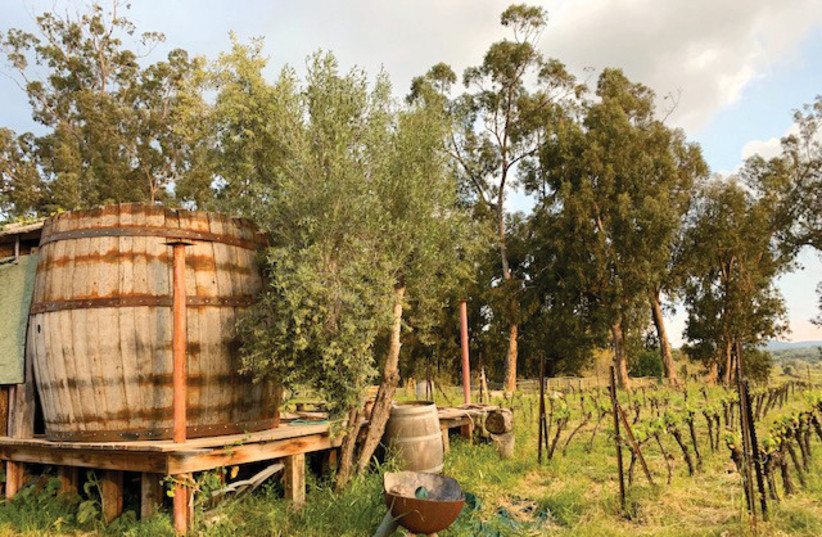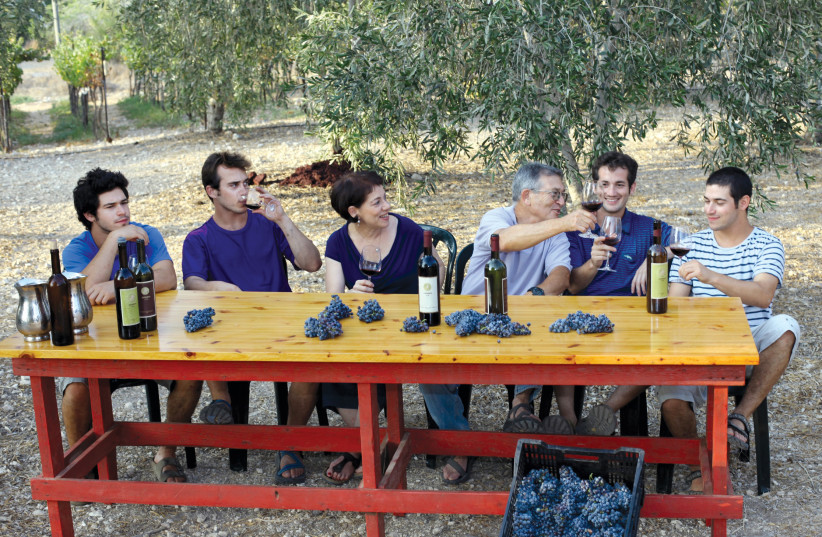The area around Jerusalem, specifically to the south betwixt the capital and Bet Shemesh, has seen some action over the millennia. A diminutive yet determined character by the name of David is said to have felled a far more robust chap called Goliath in the environs of the Ella Valley, and the Romans, Byzantines, early Muslims and Crusaders all rode roughshod through the region on their way to the holy city of Jerusalem. Naturally, they left some signs of their respective civilizations behind, including the remains of wine presses.
Winemaking has clearly been an important craft in these environs for thousands of years. One would have thought that it has been a constant source of income for locals in the Land of Israel and the modern state throughout. Indeed, today Israel produces quality wine that rivals the best of the bunch around the world, winning prizes at international competitions and building up a reputation of a desirable upmarket purchase for connoisseurs, as well as the less well versed but enthusiastic imbibers, from across the globe.
However, it seems that is not the case. “There was not very much here 30 years or so ago,” observes Nevo Hazan, who founded the boutique Nevo winery 20 years ago. “Just a couple of wineries.” The pioneering brace – Tzora and Domaine du Castel at Ramat Raziel – have been around for decades, building up a global market slot for themselves in the process. But most have been planting vineyards, nurturing the fleshy clusters and bottling the aromatic red and white alcoholic end product for about 20 years or less.
“This is not magic. There are many things to take into consideration.”
Nevo Hazan
25th Wine Festival returns to Israel's Mateh Yehuda
That renaissance is being celebrated over the next month with the 25th Wine Festival that takes place under the auspices of the Mateh Yehuda Regional Authority throughout June. A quarter of a century is quite a landmark, and every Friday there will be guided tours of boutique wineries across the region, as well as wine tasting sessions, wine launches, music, and food as the public gets to meet some of the folks that have been doing the business to the very highest standards over the years.
Everywhere you look as you drive, cycle or walk around the Judean Hills, you espy vineyards with their rows of leafy plants rippling in the breeze. My own moshav, Matta, is home to the aforesaid Nevo enterprise, which currently produces around 20,000 bottles a year and is looking to gradually double that. “We have to examine that carefully,” says Hazan. “This is not magic. There are many things to take into consideration.”

Some have been doing just that, with great success, all around the Judean Hills. Today, the area has some 15,000 dunams of vineyards, accounting for around a quarter of the national wine grape growing land use, and Tzora and Domaine du Castel have been joined by close to 40 more wineries. All told, the local industry produces approximately 25 million bottles a year. That is a pretty exponential trajectory.
AROUND 50 years ago, I recall being stuck at the old Jerusalem bus station with plenty of time on my hands as I waited for my bus to the Galilee. Feeling parched, I popped over to a nearby store and purchased a bottle of white wine. I think it was a Carmel variety, which cost around three liras. It was dirt cheap but, sadly, the vino was awful. That was light years away from the quality you get in these parts nowadays.
And the word is out, both to the domestic and offshore markets. “People come here from abroad to check out the wine and visit the wineries,” says Barak Katz, tourism manager of the Mateh Yehuda Regional Authority. It is not just the “common folk” who make their way to the Judean Hills. “We have wine journalists coming here, and we have tourists that come in groups with special guides. People who understand wine are always looking for new destinations and to see what they have to offer.”
The latter incorporates more than topnotch wine. “You have the local biblical tales and the different routes and trails around the area,” Katz continues. “There is a lot of interest in this kind of thing.”
As I learned more about the local winery folks, I got the distinct impression that you have to be fully committed to the craft if you are going to make a serious go of it. Each vintner also seemed to have a very personal story to tell about their road to winemaking. Hazan certainly falls into that category. “It is quite amazing what has happened in this area,” he notes, invoking his faith in the higher echelons of spiritual supervision and belief.
“What has happened here in recent years is nothing short of an open miracle. When I started, just over 20 years ago, I planted vineyards in soil that hadn’t been touched for years. No one here was doing anything, despite the fact that the land here was officially designated for agricultural use.”
Hazan says he hadn’t planned to get into winemaking. Born and bred on the moshav, as many a youngster from then-far-flung rural climes, he was drawn to the hustle and bustle and bright lights of Tel Aviv. But fate eventually intervened in the most brutal manner, propelling Hazan along a painful, traumatic journey which ultimately led to inner tranquility, clarity of mind and his current day job.
The last thing Hazan ever thought he would do was settle at Matta and live off the land like his Moroccan-born grandparents. One day, while he was making his usual rounds as a truck driver delivering to a village near Bethlehem, a terrorist suddenly appeared, shooting an armed guard before pointing his gun at Hazan’s head. Miraculously, the gun jammed momentarily and Hazan was able to dodge the ensuing fusillade, subsequently rushing the guard to hospital and saving his life.
Hazan carried on with his life, outwardly unaffected. But, over time, he began to experience ongoing insomnia and severe physical pain which left doctors scratching their heads. Thankfully, he eventually tracked down a therapy technique which did the trick. Looking for a more peaceful lifestyle, he returned to his old stomping ground, in Matta.
Another crisis in the family helped to push him toward winemaking. A favorite aunt, Leah, fell ill with cancer and needed to undergo treatment at Hadassah Hospital. Hazan and his wife offered her accommodation on the moshav, and their life changed. “My aunt was a force of nature,” Hazan smiles. “She was undergoing treatment and all that, but she’d get up at five in the morning to go out to pick grapes, to make wine, bake bread in an outdoor oven. She never stopped.”
Leah showed the Hazans’ offspring how to find good bunches of grapes and how to press them with their own bare feet, and end up with great wine. Hazan observed and became well and truly hooked. The rest is ongoing history at the Nevo Winery.
HAZAN SAYS that Israelis have cottoned on to the wine scene and are a far more discerning bunch these days. Part of that, surprisingly, is due to the government-imposed constraints back in the bad old coronavirus days. “If you ignore the first month or so when we didn’t earn a penny, after that, when people were allowed out of their homes, we got great exposure. People couldn’t go abroad, so they started looking for things to do and places to go, nearer home.” Jerusalemites began making the short drive over to moshavim around the Judean Hills, stopping off at places like Matta. They heard Hazan’s story, and drank to their heart’s content.

Over the years, Hazan learned the ins and outs of the business, planting his vineyards and allowing Mother Nature to keep things ticking over healthily and keeping out of her way as much as possible. “I planted east to west, which means the wind blows down the rows and keeps the pests away. I don’t use any chemical pesticides and that sort of thing. You have to respect nature and not turn your vineyards and anything else you grow into chemical junkies. You have to respect the land.”
For Hazan, nurturing vineyards and coming up with the desired beverage is a combination of intellect, spirit and emotion. He feels that the practice of making wine involves every fiber of his being – from his hands to his mind to his gut feelings. “To make wine, you have to be half engineer and half artist,” he laughs.
“You have to be precise. But you also need to know when to rely on your sixth sense. It’s like creating musical masterpieces… all from the heart and soul of Israel.” The sonic reference was not accidental. In his precious little spare time, Hazan also puts in a turn or two as a rock drummer.
JUST UP the road from Matta, over at Ness Harim, Dena and Ofir Raviv run an even smaller venture, producing just 5,000 bottles annually. Sipping some of their Syrah and the more robust Merlot, I can vouch for the quality of the Raviv Winery. “We lease around 11 dunams here,” says Dena, pointing toward rows of leafy plants that traverse the valley behind their spacious home.
Raviv goes along with the multidisciplinary multifaceted appreciation of the craft. “On the one hand, you have the laboratory aspect – check the sugar levels and that sort of thing – and you make decisions based on that,” she explains. There are plenty of nuanced gray areas in there as well.
“You have the science, but then you use your own judgment. You say, ‘I’ll try a bit more of this or that, here.’ You may get to 25% sugar and you should start harvesting, but maybe you can’t for a few days for some reason.” It is not an exact science.
“In any particular year, you may end up with different grapes,” says Raviv as we sit in the basement storage area under the house, flanked by oak barrels and gleaming metal fermentation tanks. “You have to use your experience and senses. There is trial and error in there, too.”
It may not be a matter of nailed on recipes, but our local winemakers have been doing us proud over the years. And while we are not about to challenge the French industry – in terms of mere quantity, we lag way behind them, producing around half a billion bottles a year compared with seven to eight billion the veteran French vintner community puts out – we have something special to show the rest of the world. Hazan, for example, exports around 70% of his output to the kosher wine market in the United States.
Katz says he can’t wait for the Wine Festival to kick off and to show us what the wineries here have to offer. By all accounts, that is plenty as evidenced by appreciation of the industry’s top brass of our local product. “We have received approval of appellation,” he notes, referencing the legally defined and protected geographical classification primarily used to identify where grapes for wine are grown. That is often utilized for international marketing purposes, adding a feather or two to the brand’s cap.
In addition to the cultivating and production endeavors, there is also a prestigious school at Kibbutz Nachshon that trains new vintners – Hazan is a graduate – and Ariel University is conducting research into traditional grape varieties that were in use in biblical times. The idea is to renew cultivation of the time-honored species which, no doubt, will introduce even more added value to the local winemaking scene.
Other wineries in the festival circuit include Seahorse, Tzuba, Roglit, Ella Valley, Zafririm, Hans Sternbach, Adulam, Sphera, Kela David and Flam, to mention but a few. ❖
For more information: (02) 995-8650, *8108 and www.tour-yehuda.org.il
